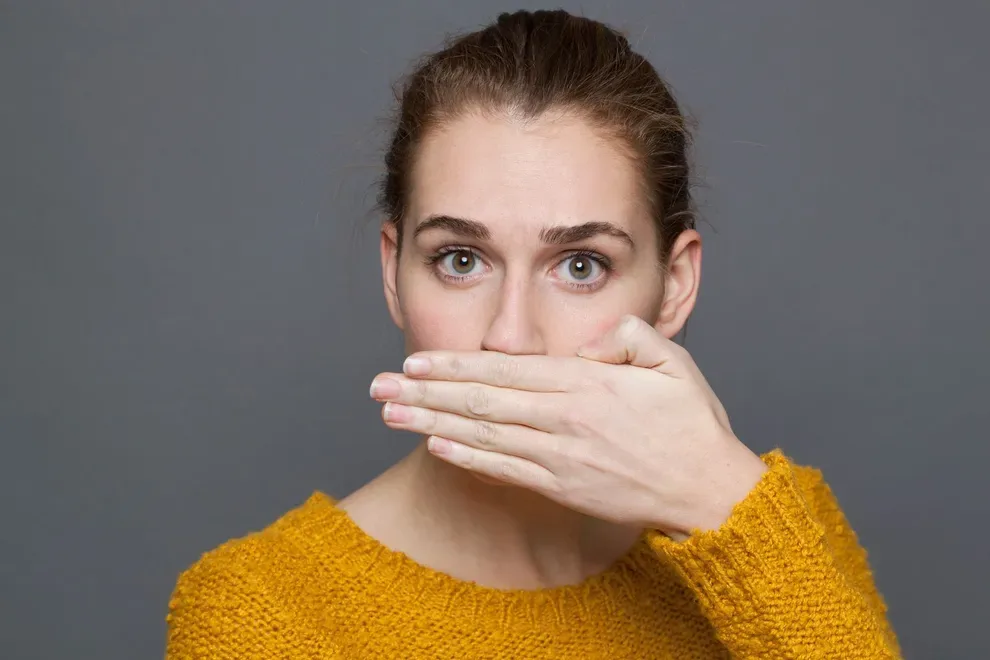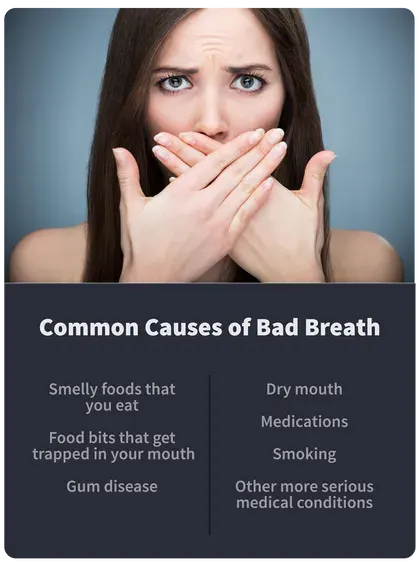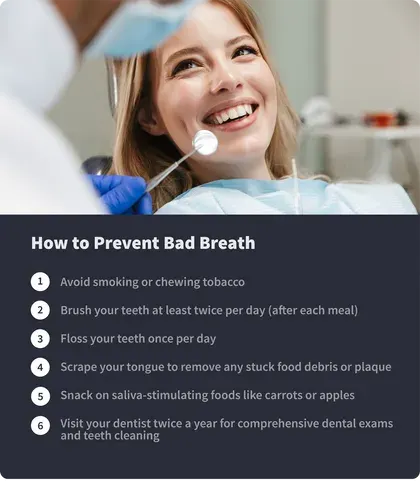Halitosis – What Causes It & Can it Be Treated?

Table of Contents
- What Is Halitosis?
- Common Causes
- Identifying Your Own Bad Breath
- Treatment Options
- Prevention
What Is Halitosis?
Halitosis is characterized by persistent bad breath, which people around you may be able to detect when you talk. Having the unpleasant odors can have a negative impact on your social or work life, even if you don’t realize you have the condition.
While chronic bad breath isn’t considered a serious medical on its own, it is a sign of an oral or body health problem. It doesn’t go away on without treatment and likely has an underlying cause severe enough to warrant medical attention.
If you’ve had unpleasant mouth odors, there are effective treatment options and home remedies that can help you.
Common Causes of Bad Breath

Bad breath has multiple possible causes, ranging from the food you eat to poor dental hygiene to issues with your esophagus or stomach. Uncontrolled bacterial growth in the mouth plays a huge role in most of these factors.
Typical causes of halitosis are:
Smelly foods that you eat
Food bits that get trapped in your mouth and don’t get removed in a timely manner
Gum disease
Dry mouth
Medications
Smoking
And other more serious medical conditions
Certain strong ingredients in your diet can cause bad breath, such as onions and garlic. These foods contain pungent compounds that get absorbed into your bloodstream following digestion and then get circulated into your lungs. As long as the food is in your system, unpleasant odors can linger in you mouth – and come out when you breathe and talk.
Any small pieces of food that remain in your mouth after you eat promote the growth of stench-causing bacteria. Over time, any bacterial buildup on your teeth forms plaque, which can cause gum disease—another factor in bad breath.
Food particles trapped on your tongue can also set the stage for bacterial growth, causing unpleasant odors as the bits decompose. Tiny food debris can accumulate in the mouth due to poor dental hygiene habits such as:
Not brushing and flossing teeth regularly, especially after meal
Poor denture care
Insufficient saliva production causes dry mouth, creating an ideal environment for bacterial buildup. You usually experience it during sleep, which is why you wake up with bad breath in the morning.
Persistent dry mouth isn’t normal and may indicate an underlying condition that inhibits saliva production in the salivary glands.
Prescription drugs that prevent the salivary glands from producing enough saliva may contribute to bad breath. Similar to strong-smelling foods in your regular diet, medications that you take can release pungent chemicals in your body upon breakdown.
Bad breath lingers after the use of tobacco products like cigarettes and cigars. Smoking tobacco can also cause gum disease, resulting in off-putting mouth odors.
Bad breath may originate in other infected areas like the nose, sinuses, or throat. Diseases like cancer or conditions such as chronic acid reflux or stomach ulcers can also cause displeasing mouth odors.
Acidic damage to the esophagus (called gastroesophageal reflux, or GERD) or stomach (ulcers) not only push awful smells back through your throat and into your mouth, it also delivers other side effects, such as a persistent cough or incessant pain.
A combination of bad breath with constant pain or a lingering cough is a sign to seek help identifying your exact condition and getting treatment for it.
Can You Tell if You Have Bad Breath on Your Own?
The embarrassment that comes with bad breath may tempt some people to self-diagnose by breathing into their hand. There are two main reasons why this doesn’t work:
The air you breathe out doesn’t necessarily carry any unpleasant odors from the back of your mouth. Talking is a more effective way to bring out bad odors from a deeper point of origin.
Prolonged exposure to your own bad breath makes it difficult to tell the difference between good and bad odor. As such, you may wrongly think that any bad odor you had is gone only for a friend to confirm the opposite over a casual conversation.
Instead of self-diagnosing, it’s best to ask a close confidant to assess how your breath smells. Better yet, see your doctor or periodontist if you’re concerned about your breath.
According to a study conducted by the Academy of General Dentistry, up to eighty million people globally suffer from chronic breath, equating to one in four people.
Treatment Options for Bad Breath
Your dentist will prescribe the right solution based on the cause of your bad breath. Some effective treatment options include antimicrobial therapy, gum disease treatment, and treatment for other conditions.
Antimicrobial Therapy
Antimicrobials contain compounds capable of fighting odor-causing bacteria. It may be a tooth paste or swish-and-spit mouth rinse.
If you’re going to use a therapeutic mouthwash, the American Dental Hygienists Association (ADHA) recommends sugarless and alcohol-free antimicrobials. Effective ingredients in most of these products include essential oils, chlorine dioxide, and zinc chloride.
Gum Disease Treatment
When gum disease is the cause of your bad breath, it requires treatment. Your periodontist may also clean your teeth to remove plaque and tartar beneath and above the gum line.
Bad odor and any inflammation on the gum should go away after this treatment.
Treatment for Underlying Health Conditions
If your dentist suspects an underlying condition is behind your bad breath, they might ask you to take some tests. You’ll usually need to see your primary care doctor or medical specialist for comprehensive exams and treatment.
How to Prevent Bad Breath

Bad breath prevention is a lifelong commitment that entails the following regular efforts:
Avoid lifestyle/dietary causes of bad breath, including smoking or chewing tobacco
Brush your teeth at least twice per day (after each meal) to prevent bacterial buildup
Flossing your teeth once per day removes plaque and food particles that may decompose and cause bad breath
Scrape your tongue to remove any stuck food debris or plaque (use a tongue scrapper because a toothbrush isn’t effective)
Snack on saliva-stimulating foods like carrots or apples
Visit your dentist twice a year for comprehensive dental exams and teeth cleaning
